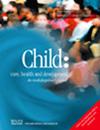Developmental Scores and Prevalence of Functional Difficulty Among Preschool Children in Kenya
Abstract
Background
Disability-inclusive early childhood development and education (ECDE) plays a crucial role in ensuring that all children, including those with disabilities, reach their developmental potential. However, there is little data on the prevalence of disability in mainstream ECDE in most low- and middle-income countries (LMICs), or on early learning and developmental outcomes of children with disabilities in these classrooms.
Methods
Data were collected on 1756 children aged 3–9 years enrolling in ECDE at 18 schools in Homa Bay or Turkana Counties, Kenya, at the start of the 2021 and 2022 school years. The UNICEF/Washington Group Child Functioning Module (CFM) measured the prevalence of functional difficulty, and the International Development Early Learning Assessment (IDELA) measured child development and learning.
Results
Mainstream classes in sampled preschools included significant proportions of children with functional difficulties (19.9% in Homa Bay; 8.8% in Turkana). In both sites, the odds of having at least one functional difficulty were significantly higher among those aged 5 and above (OR = 2.82 for Homa Bay; 5.76 for Turkana). Multivariate regression found no relationship between functional difficulty and sex or household income.
Among children aged 2–4 years in Homa Bay, functional difficulty was most often reported in the domain of controlling behaviour (4.4%), whereas in Turkana, mobility (1.4%) was most common. For children aged 5 and above in Homa Bay, difficulty with accepting change (11%) was most frequently reported, whereas in Turkana it was anxiety (6%).
Median IDELA scores were 49 in Homa Bay and 31 in Turkana. Scores increased with child age. Regression models accounting for age- and school-level clustering found no statistically significant differences by sex. Functional difficulties were associated with lower median IDELA scores in Turkana only (β = −5.44 [−8.86, −2.02]).
Conclusion
Findings highlight the importance of appropriate, sustainable support for inclusive ECDE in both settled communities and refugee settings.

 求助内容:
求助内容: 应助结果提醒方式:
应助结果提醒方式:


